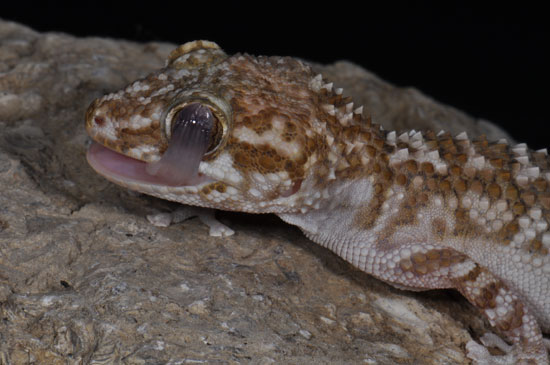Over the last couple of years I’ve collaborated with Tony Gamble on a survey of karyotypes in geckos. Tony is studying the evolution of sex determining mechanisms and geckos are an ideal model clade for such an endeavor because they have evolved every mechanism known in vertebrates.

An adult male of the undescribed Paroedura species in our study cleans his eye. Gekkonid geckos lack moveable eyelids and so clean their eyes with their tongues.
Around the time this collaboration started I “discovered” an undescribed gecko from the Malagasy genus Paroedura on a reptile dealer’s list. I sent all of the specimens to Tony for karyotyping, and the results from this study were published in this month’s African Journal of Herpetology.
In addition to the Pareodura sp., we also investigated P. picta which has been shown through incubation experiments to have genetic sex determination. Although P. picta and the undescribed species have different numbers of chromosomes (2n=36 vs. 2n=34, respectively), neither species showed evidence of heteromorphic sex chromosomes. Our phylogenetic analyses reveal P. sp. is genetically divergent from all other characterized Paroedura species, including other undescribed candidate species. Interestingly, P. sp. forms a well-supported clade with P. bastardi, P. ibityensis, P. tanjaka, and an additional undescribed species. Although karyotypes from these species remain unknown, preliminary, unpublished incubation data suggest this clade contains species with genetic sex determination (P. bastardi) and temperature sex determination (P. ibityensis).
Unfortunately, not much is known about the undescribed species in our study – we don’t even have a clue where on the island of Madagascar it is found. Thus, our results also highlight the need for continued research in the taxonomy and distribution of Malagasy animals.

